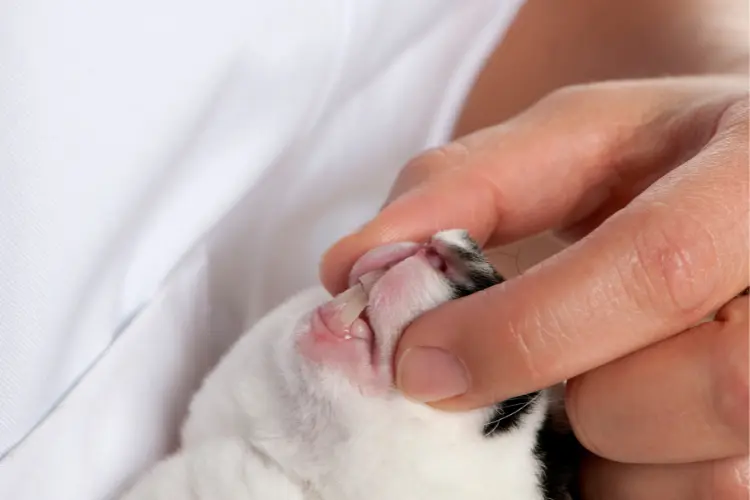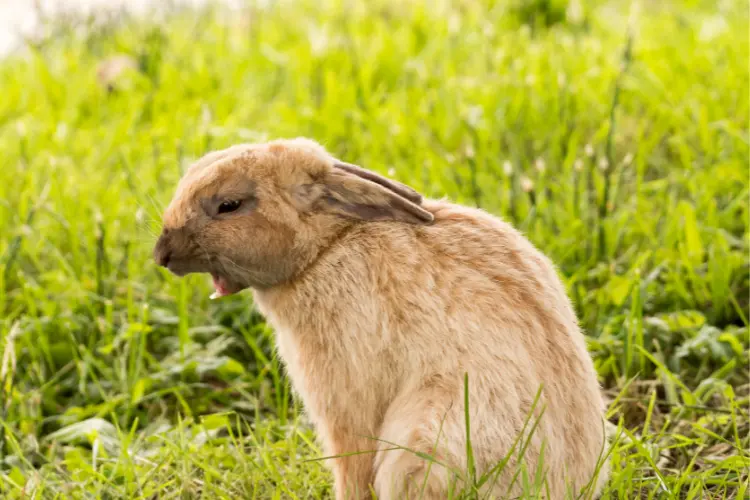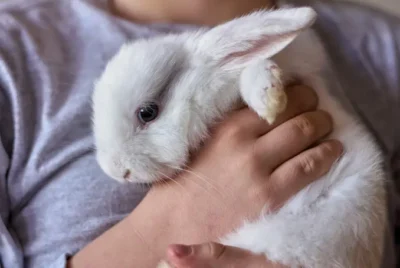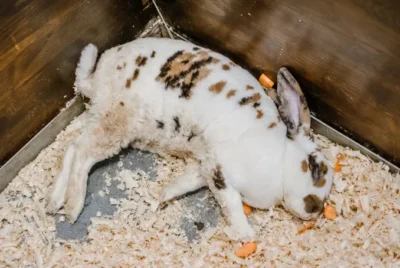Dental Disease in Rabbits: Types, Causes and Treatments
Are you a dedicated rabbit owner who’s ever watched your furry friend wince in discomfort or struggle to eat? Rabbits can suffer silently from a range of dental issues that not only affect their overall health but also tug at your heartstrings as their caregiver.
In this comprehensive guide, we’ll delve into the dental disease in rabbits, exploring its causes and, most importantly, how to prevent these painful issues from plaguing your beloved bunny. Let’s ensure your rabbit’s well-being and put those dental disease worries to rest once and for all.
Common Types of Dental Disease in Rabbits
Malocclusion
Malocclusion is a prevalent dental problem in rabbits. It occurs when a rabbit’s incisors, the front teeth, become misaligned. This can be due to congenital jaw malformation or other factors. Misaligned incisors can make it difficult for the rabbit to eat and can lead to pain and discomfort.
In severe dental disease cases, a veterinarian may recommend extracting the incisors. Surprisingly, rabbits can still thrive without their front teeth, relying on their back teeth to munch on hay and pellets.
Dental Caries
Just like humans, rabbits can suffer from dental caries, commonly known as cavities. Dental caries happen when bacteria in the mouth produce acids that damage the tooth enamel. If left untreated, dental caries can result in pain and deterioration of all the teeth. Preventing dental caries in rabbits involves providing a healthy diet and proper dental care.
Periodontal and Endodontal Disease
Periodontal disease affects the gums, while endodontal disease affects the pulp inside the tooth roots. These dental diseases can lead to inflammation, tooth loss, and severe pain for rabbits. Periodontal and endodontal diseases may go unnoticed until a rabbit exhibits signs of distress or when addressing incisor teeth issues. It’s crucial to have both incisors and cheek teeth checked regularly by a rabbit-savvy veterinarian.
Spurs and Spikes
When a rabbit’s cheek teeth don’t wear evenly, they can form sharp spurs or spikes that lacerate the rabbit’s tongue, cheeks, and other soft mouth tissues. Despite their small size, these sharp points can cause significant problems, as rabbits try to avoid using the affected teeth, leading to further dental issues and discomfort. Regular rabbit dental check-ups and a well-balanced diet can help prevent the formation of spurs.
Long in the Tooth
Rabbit teeth grow continuously throughout their lives. Proper alignment is crucial for effective wear, and when lower and upper teeth don’t meet properly, serious problems can arise. Overgrown incisors can become astonishingly long, and molars may develop sharp edges or spurs. These abnormalities can cause severe pain and restrict a rabbit’s eating ability. Timely veterinary intervention is essential to address these issues and prevent further complications.
Fractures
Fractures of rabbit teeth, particularly incisors, can occur due to various reasons, including head injuries or overgrown teeth. Improper dental treatment can also lead to tooth fractures. Specialized dental equipment is necessary for safe and effective treatment, emphasizing the importance of seeking expert care for dental issues.
Tooth Root Abscess
Facial abscesses are often associated with dental diseases in rabbits. They can be hard to treat and require professional veterinary care. Early detection can be the key to avoiding the formation of tooth root abscesses, which can result from infected teeth or gums.
If you want to get a rabbit, read our article about what you need to know about getting a rabbit as your house pet.

Signs of Dental Disease in Rabbits
- Changes in Eating Habits: Keep an eye on your rabbit’s eating habits. Dental problems can lead to decreased appetite or difficulty eating. If your rabbit is picking at food, dropping it, or hesitating to eat, it could be due to dental pain.
- Weight Loss: Dental issues can result in weight loss due to decreased food intake or rabbit stops eating. If your rabbit is losing weight despite having access to food, it may be a sign of dental disease.
- Excessive Salivation: Rabbits with dental problems may drool or have wet, matted fur around their mouth due to increased salivation. This can be a noticeable sign of discomfort.
- Reduced Grooming: Dental pain can make grooming difficult for rabbits. If you notice your rabbit has stopped grooming themselves, leading to a scruffy or unkempt appearance, it may indicate dental problems.
- Changes in Stool: Dental issues can affect a rabbit’s ability to digest food properly. You may notice changes in the size, shape, or consistency of their feces. Diarrhea or smaller, misshapen pellets could be indicators of dental disease.
- Reluctance to Chew or Play: Rabbits typically enjoy chewing on toys and hay to maintain their dental health. If your rabbit is avoiding chew toys or shows less interest in hay, it could be due to dental pain.
- Facial Swelling: Facial swelling, particularly around the jawline, can be a sign of abscesses resulting from dental infections. This can cause discomfort and should be examined by a veterinarian.
- Audible Teeth Grinding: Rabbits may grind their teeth audibly when they are in pain. This is a clear sign that your rabbit is experiencing discomfort.
- Foul Odor: Dental disease can lead to bad breath in rabbits. If your rabbit’s breath suddenly becomes unpleasant, it may be due to dental issues.
- Behavioral Changes: A rabbit in pain may exhibit changes in behavior, such as increased irritability, aggression, or hiding. Behavioral changes can be subtle but are important to observe.
- Eye Problems: Dental disease can sometimes cause eye problems in rabbits, including excessive tearing or discharge from the eyes.
- Excessive Drooling: In addition to wet fur around the mouth, you may notice excessive drooling in rabbits with dental problems.

Treatment and Prevention of Dental Diseases in Rabbits
Diet
A well-balanced diet can really help to prevent dental disease in rabbits. An unlimited supply of high-quality hay, such as timothy hay, promotes healthy chewing and natural teeth wear. Fresh vegetables provide essential nutrients and require chewing, further benefiting dental health.
Owners should limit sugary and starchy treats contributing to dental problems and obesity. Prevention through diet is crucial, but if dental issues have already emerged, veterinarians may recommend dietary modifications, including syringe feeding, to ensure proper nutrition during treatment.
Tooth Trimming
Regular rabbit dental check-ups are essential for maintaining a rabbit’s dental health. Tooth trimming can prevent acquired dental disease when employed during these check-ups to address overgrown teeth and spurs that can lead to dental issues.
Veterinarians use specialized tools to trim or reshape the rabbit’s teeth even their peg teeth, ensuring they remain at an appropriate length for effective chewing and preventing discomfort. Routine tooth trimming not only promotes dental health but also helps prevent more severe dental problems from developing over time.
Tooth Removal
Tooth removal is an option for severe dental issues, such as malocclusion or tooth abscesses. While it is not a preventive measure, it can be a necessary intervention to alleviate pain and improve a rabbit’s quality of life.
Rabbits can adapt well to losing their front incisors, as they primarily rely on their back teeth called cheek teeth, for chewing. Tooth extraction is typically performed by a veterinarian experienced in rabbit dentistry, and it may involve removing one or more problematic teeth.
Grooming
Grooming plays a supportive role in maintaining a rabbit’s dental health. If a rabbit has difficulty grooming themselves due to dental pain or discomfort, owners should step in and assist with brushing their fur.
This not only helps prevent matting and hygiene issues but also contributes to the rabbit’s overall comfort. Grooming can be particularly important if mats or debris become stuck in the fur, as these can exacerbate dental problems and lead to further complications.

Medication
Medication is a crucial component of treating dental disease in rabbits, particularly when it comes to managing pain and infections. Dental problems can cause considerable discomfort, and pain management is essential to improve a rabbit’s overall well-being during treatment.
In addition to pain relief, antibiotics may also be prescribed to treat infections associated with dental disease. Medication should always be administered under the guidance of a veterinarian experienced in rabbit care, as dosages and treatment plans may vary based on the specific condition.
Syringe Feeding
Syringe feeding is not a preventive measure but a vital aspect of treatment when dental issues result in a lack of appetite or difficulty eating. It ensures that the rabbit receives essential nutrition while their dental problems are addressed. Veterinarians may prescribe a specialized diet for syringe feeding to meet the rabbit’s dietary requirements.
Syringe feeding can be a temporary solution to support the rabbit’s health during recovery, with the ultimate goal of restoring their ability to eat independently as dental issues are resolved.
Conclusion
One common health concern for rabbits is dental disease. It’s essential to learn about the different types of dental issues, what causes them, and how to treat them. By understanding these aspects, we’re better equipped to care for our pet rabbits.
We can observe for signs of dental problems, take steps to prevent them and ensure our rabbits get the right care when needed. This shows our commitment to keeping our rabbits happy and free from any pain caused by dental issues. It’s all about ensuring our pets have a comfortable and healthy life, and it strengthens the special bond we share with them.




